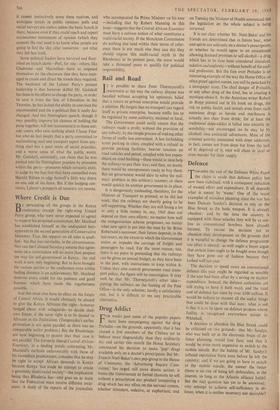Defence
TOWARDS the end of the Defence White Paper the claim is made that defence policy has now been stabilised, with a consequent reduction of wasted effort and expenditure. It all depends what is meant by 'waste.' One of the worst examples of mistaken planning since the war has been Duncan Sandys's decision to rely on the Blue Streak as the basic weapon. It is already obsolete: and by the time the country is equipped with these missiles they will be as use- less as conventional bombers have already become. To excuse the decision not to abandon their development on the grounds that it is wasteful to change the defence programme too often is absurd : as well might a buyer argue that certain lines ought to be bought even though they have gone out of fashion because they looked well last year.
The decision to spend more on conventional defence this year might be regarded as sensible if the cost had been offset by a saving on nuclear expenditure. Instead, the defence authorities are still trying to have it both ways, and the total cost of defence has risen by over £100 million. It would be tedious to recount all the useful things that could be done with that sum: what is sad is that it is to be spent on defence projects whose futility is recognised everywhere except in Whitehall.
A decision to abandon the Blue Streak could be criticised on two grounds : that Mr. Sandys, who was built up as the electronic brain of de- fence planning, would lose face; and that it would be even more expensive to switch to the mobile missile. But the bubble of Mr. Sandys's inflated reputation burst even before he left the ministry; and if we are going to have to switch to the mobile missile, the sooner the better (there is no risk of being left defenceless, in the interim, so long as the Atlantic alliance holds). But the real question has yet to be answered: why attempt to achieve self-sufficiency in de- fence, when it is neither necessary nor desirable?






































 Previous page
Previous page